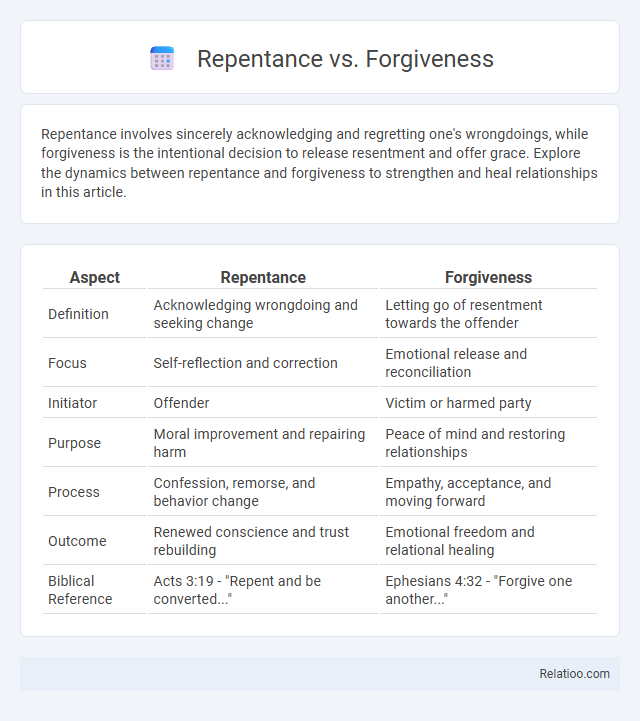Repentance involves sincerely acknowledging and regretting one's wrongdoings, while forgiveness is the intentional decision to release resentment and offer grace. Explore the dynamics between repentance and forgiveness to strengthen and heal relationships in this article.
Table of Comparison
| Aspect | Repentance | Forgiveness |
|---|---|---|
| Definition | Acknowledging wrongdoing and seeking change | Letting go of resentment towards the offender |
| Focus | Self-reflection and correction | Emotional release and reconciliation |
| Initiator | Offender | Victim or harmed party |
| Purpose | Moral improvement and repairing harm | Peace of mind and restoring relationships |
| Process | Confession, remorse, and behavior change | Empathy, acceptance, and moving forward |
| Outcome | Renewed conscience and trust rebuilding | Emotional freedom and relational healing |
| Biblical Reference | Acts 3:19 - "Repent and be converted..." | Ephesians 4:32 - "Forgive one another..." |
Understanding Repentance: Definition and Importance
Understanding repentance involves recognizing it as a sincere change of heart and mind, leading to a commitment to turn away from past wrongdoings. Repentance is crucial for personal growth and spiritual renewal, as it fosters self-awareness and a desire to improve one's actions. Your ability to truly repent sets the foundation for seeking forgiveness, which is the act of others releasing judgment or punishment for your mistakes.
Forgiveness Explained: Meaning and Significance
Forgiveness involves consciously choosing to release feelings of resentment or vengeance toward someone who has caused harm, fostering emotional healing and reconciliation. It signifies a profound act of compassion that breaks the cycle of anger and promotes mental well-being by reducing stress and enhancing empathy. The significance of forgiveness extends beyond personal relief, influencing healthier relationships and creating a foundation for social harmony and emotional resilience.
The Core Differences Between Repentance and Forgiveness
Repentance involves recognizing your wrongdoings, feeling remorse, and committing to change your behavior, while forgiveness is the act of letting go of resentment towards someone who has wronged you. Repentance requires a personal transformation and accountability, whereas forgiveness centers on emotional release and reconciliation. Understanding these core differences empowers you to foster healing in relationships by aligning your actions with genuine remorse and offering grace to others.
The Role of Empathy in Repentance and Forgiveness
Empathy plays a central role in both repentance and forgiveness by fostering genuine understanding of the emotional impact caused by wrongful actions. During repentance, empathy drives individuals to acknowledge harm, cultivate remorse, and seek meaningful reconciliation. In forgiveness, empathy enables the aggrieved party to perceive the sincere remorse of the offender, facilitating emotional healing and restoration of trust.
Psychological Benefits of Repenting and Forgiving
Repentance and forgiveness both play crucial roles in emotional healing by reducing feelings of guilt, shame, and resentment. Your psychological well-being improves as repenting fosters self-awareness and accountability, while forgiving others helps release anger and promotes inner peace. Embracing both processes enhances mental health, encouraging empathy, resilience, and stronger interpersonal relationships.
Spiritual Perspectives on Repentance vs Forgiveness
Spiritual perspectives emphasize repentance as a sincere inner transformation and acknowledgment of wrongdoing, while forgiveness embodies the compassionate release of judgment by oneself or others. Repentance involves personal accountability and a commitment to change, often seen as a prerequisite for receiving divine forgiveness. Forgiveness, in many religious traditions, is a grace extended beyond human merit, fostering healing and restoration in relationships and spiritual growth.
Common Misconceptions About Repentance and Forgiveness
Common misconceptions about repentance and forgiveness include the belief that repentance is merely feeling sorry, rather than a genuine turning away from wrongdoing, and that forgiveness requires condoning the offense, when in fact it involves releasing resentment while seeking healing. Many assume forgiveness must be immediate or unconditional, overlooking that it is a process often intertwined with personal boundaries. Your understanding deepens when you recognize repentance as a sincere transformation and forgiveness as a conscious decision to let go of bitterness without forgetting the lessons learned.
Steps to Genuine Repentance
Genuine repentance involves recognizing and admitting wrongdoing, feeling sincere remorse, and committing to change behavior to avoid repeating the same mistakes. Steps to repentance include confessing sins honestly, seeking forgiveness from those harmed, and making amends to restore relationships. Unlike forgiveness, which is granted by others to release resentment, or repentance, which is an internal process, genuine repentance requires active effort toward personal transformation.
Pathways to Authentic Forgiveness
Pathways to authentic forgiveness involve understanding the distinctions between repentance and forgiveness, where repentance requires sincere remorse and commitment to change, while forgiveness entails releasing resentment and offering grace. You achieve genuine reconciliation by embracing empathy, open communication, and personal healing processes that foster trust and emotional restoration. Cultivating these elements enables deeper, more meaningful connections and sustained peace.
Achieving Harmony: Balancing Repentance and Forgiveness
Achieving harmony between repentance and forgiveness requires understanding that true repentance involves sincere remorse and a commitment to change, while forgiveness is the willingness to release resentment and restore relationships. Your path to inner peace and improved connections depends on balancing these elements, acknowledging personal accountability without withholding compassion for others. Fostering this equilibrium promotes emotional healing, mutual respect, and sustained harmony in both personal and communal interactions.

Infographic: Repentance vs Forgiveness
 relatioo.com
relatioo.com